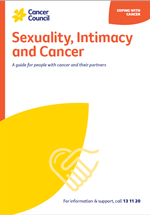- Home
- Bladder cancer
- Muscle-invasive bladder cancer treatment
- Surgery: cystectomy
- Sexuality and fertility after cystectomy
Sexuality and fertility after cystectomy
A cystectomy can affect sexual activity and fertility in many ways. You may find these changes upsetting and worry about how they’ll affect your relationships. Ask you treatment team for information about ways to manage these changes. It may be helpful to talk about how you’re feeling with your partner, family members or a counsellor.
For more on this, see Sexuality, intimacy and cancer and Fertility and cancer.
Learn more about:
Changes for males
| nerve damage to the penis |
A cystectomy can often damage nerves to the penis, but the surgeon will try to prevent or minimise this. Nerve damage can make it difficult to get an erection. Options for improving erections include:
|
| orgasm changes |
If the prostate and seminal vesicles are removed along with the bladder, you will not be able to ejaculate after a radical cystectomy. You can still feel the muscular spasms and pleasure of an orgasm even if you cannot ejaculate or get an erection, but it will be a dry orgasm because you no longer produce semen. |
| fertility changes |
If the prostate and seminal vesicles are removed, you will no longer produce semen. This means you won’t be able to have children naturally. If you might want to have children in the future, talk to your treatment team about whether you can store sperm at a fertility clinic before treatment. The sperm could then be used when you are ready to start a family. |
Changes for females
| vaginal changes |
Sometimes, the vagina may be shortened or narrowed during a cystectomy. Nerves that help keep the vagina moist can also be affected, making the vagina dry. These changes can make penetrative sex difficult or uncomfortable at first. Ways to manage these changes include:
|
| arousal changes |
A cystectomy can damage the nerves in the vagina or reduce the blood supply to the clitoris, which can affect how you become aroused and your ability to orgasm. Talk to your surgeon or nurse about ways to minimise potential side effects. You can also try exploring other areas of your body that feel pleasurable when touched, such as the breasts, inner thighs, feet or buttocks. |
| menopause and fertility |
Sometimes, the uterus and other reproductive organs are removed during a radical cystectomy. This will cause menopause if you have not already been through it. Your periods will stop, you will no longer be able to become pregnant, and you may have menopausal symptoms such as hot flushes and vaginal dryness. Talk to your doctors about ways to deal with symptoms of menopause. |
→ READ MORE: Systemic chemotherapy
Podcast: Sex and Cancer
Listen to more of our podcast for people affected by cancer
More resources
Dr Prassannah Satasivam, Urologist and Robotic Surgeon, Epworth Hospitals and Cabrini Hospitals, VIC; Donna Clifford, Urology Nurse Practitioner, Royal Adelaide Hospital, SA; Marc Diocera, Genitourinary Nurse Consultant, Peter MacCallum Cancer Centre, VIC; Dr Renee Finnigan, Radiation Oncologist, Gold Coast University Hospital, QLD; Lisa Hann, 13 11 20 Consultant, Cancer Council SA; Dr Andrew Hirschhorn, Director of Allied Health and MQ Health Academy, MQ Health, Macquarie University, NSW; Anne Marie Lyons, Stomal Therapy Nurse, Concord Hospital and NSW Stoma Limited, NSW; John McDonald, Consumer; Prof Manish Patel, Urological Cancer and Robotic Surgeon, Westmead Hospital, Macquarie University Hospital, and The University of Sydney, NSW; Dr Jason Paterdis, Urological Surgeon, Brisbane Urology Clinic, QLD; Graeme Sissing, Consumer; Prof Martin Stockler, Medical Oncologist, The University of Sydney, Concord Cancer Centre, and Chris O’Brien Lifehouse RPA, NSW.
View the Cancer Council NSW editorial policy.
View all publications or call 13 11 20 for free printed copies.

